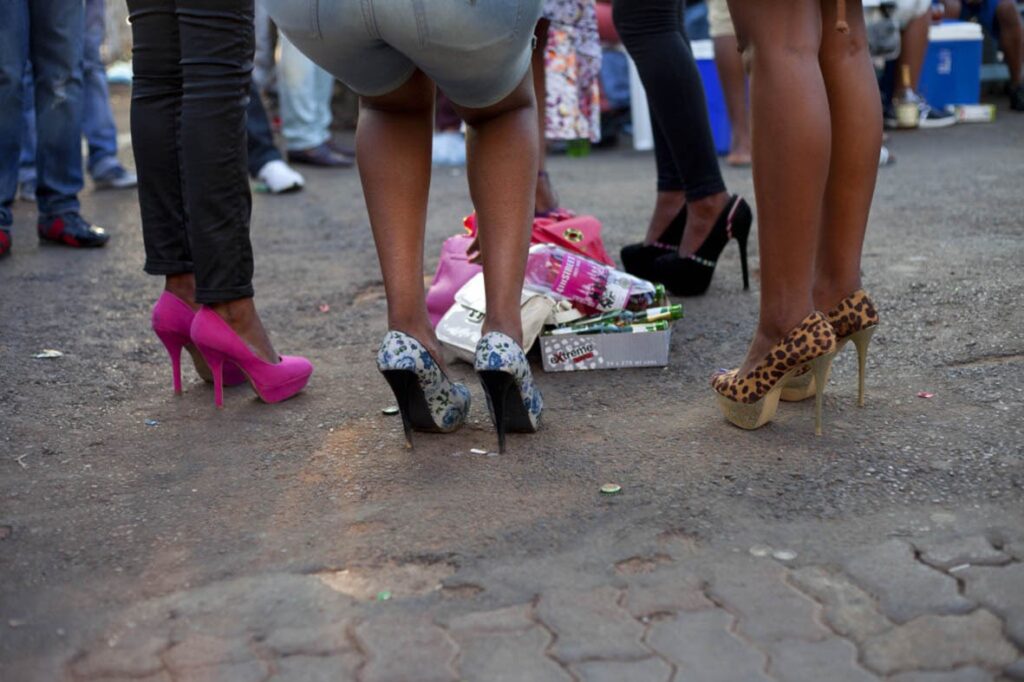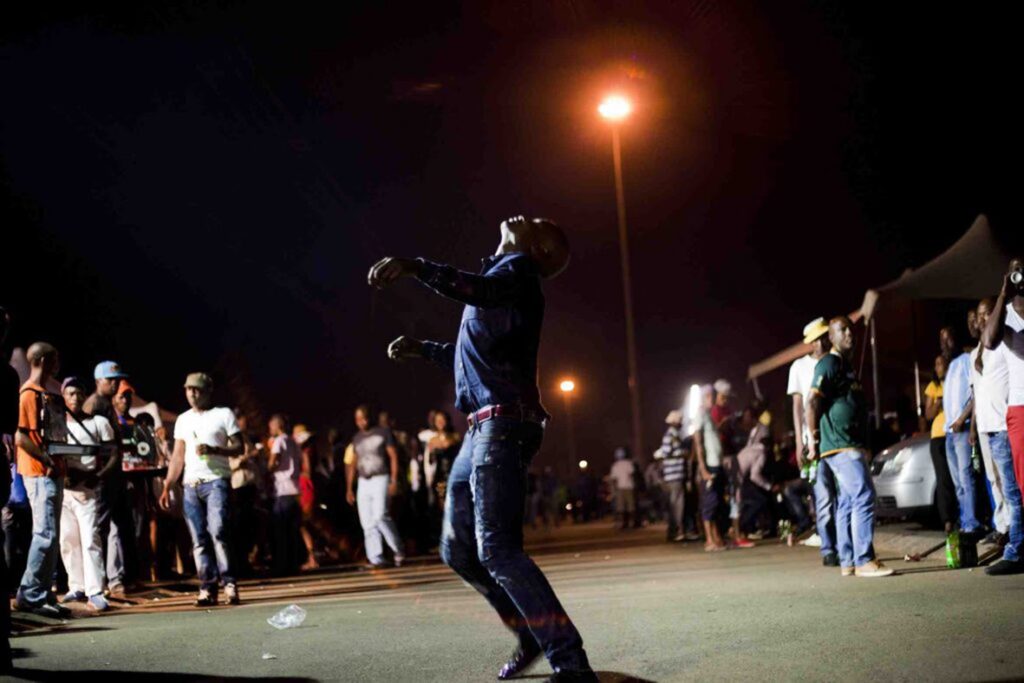Thobela! Boom Shaka’s Lebo Mathosa performing in 2005. The group captured the imagination of a youth that was stepping out of the doldrums of apartheid. (Photo: Lefty Shivambu/Touchline/Getty Images)
At the height of its popularity in the 1990s and early 2000s, kwaito was enjoyed by young Black people as dance music. Although kwaito has been one of the most popular music genres in post-1994 South Africa, it has generally been perceived as a genre lacking political content. Writer and former arts editor Sandile Memela once described kwaito as “music with no meaning or purpose” that glorifies “thuggery and self-abuse”.
The problem with such simplistic dismissals is that they miss the alternative subjectivities and potentially subversive identity politics at play in this music. There are different conceptions of kwaito, but we contend that this music is not a priori meaningless or useless, as most people seem to think. Going beyond the technical level of music-making, we attempt to take seriously the alternative sociality imagined through the music.
We aim to show the problems for thought (both ideologically and at the level of policymaking) that are created by the conceptual separation of Black popular music from “the political” as such. The argument is that kwaito and house music have broadened the scope of “the struggle” by complicating the meanings of freedom and, indeed, politics itself in the so-called post-apartheid period.
Because kwaito emerged at a time when many young people in the townships were revolting against the colonial governmentality of late apartheid society, the music can be thought of as constituting an alternative form of the political. Although the riots in the townships, in the wake of the 1976 student uprising were directed at the apartheid state, the subcultural aspects of this rebellion, represented by the pantsula and kwaito generation, also challenged parental authority in the home and community.
The social conservatism of the colonial-apartheid system had seeped into people’s homes and adults were generally seen as a reactionary stumbling block to the urgent attainment of freedom. Cultural critic Bongani Madondo captured this sentiment when he wrote: “We weren’t our parents. We weren’t obedient Blacks.”
So, although the “1994 moment” represented an attempt to manage the political economic crisis of the late apartheid state, it can be said that not nearly as much attention was paid to the social crisis precipitated by the contradictions of apartheid society. The “new” country remained deeply divided, racial resentment at fever pitch. The hollowness of the “rainbow nation” narrative, coupled with the state’s initial failure to manage the public-health crisis unleashed by the HIV pandemic, underscore both the teleology and social conservatism of the ANC’s thinking during the turn of the 21st century.
The blame for this crisis was shifted onto the Black youth, who were increasingly being written about as an apolitical and sexually promiscuous generation. This is why we read the moral panic in response to kwaito’s so-called sexually suggestive performances in line with postcolonial visual arts scholar Kobena Mercer’s observation that “questions of sexuality have come to mark the interior limits of decolonisation, where the utopian project of liberation has come to grief”. In other words, just as colonial and apartheid regimes repressed Black sexuality, so too does the so-called post-apartheid dispensation.
 Politics on the street: (from left) A group of women partying at Hurricanes in Katlehong. (Muntu Vilakazi)
Politics on the street: (from left) A group of women partying at Hurricanes in Katlehong. (Muntu Vilakazi)
Contrary to those who see a “lost generation”, we present an image of a youth whose engagements with the politics of identity are endless attempts at the recreation of the self through their dancing bodies. If the rainbow nation is a liberal, multicultural project, we aim to posit post-1994 South African dance music(s) as a discourse about the freedom to “self-style” (to borrow from Achille Mbembe) after years of colonial and apartheid encroachment on the everyday experience of Black people.
Now, one cannot talk about the youthful expressive body at the time of the transition without making mention of Boom Shaka. “The most controversial group in the country”, according to one of its members, Lebo Mathosa, who said they would be remembered for “our controversial dancing, of the way we dressed, the sexy way of dancing”. Twenty-seven years after the fact, we can definitely say that indeed, Mathosa was right. Boom Shaka’s music performances captured the imagination of a youth that was stepping out of the doldrums of apartheid and waving “Thobela” to the “gong” of freedom, because: “It’s about time!”
They opened their 1998 studio album, Words of Wisdom, with ‘a “housified” [sic] version of Nkosi Sikelel’ iAfrika, the South African national anthem” — an event that Bhekizizwe Peterson describes as the “horror of horrors” (at least from the perspective of the government elite).
Agreeing with Gavin Steingo, who writes that “by setting South Africa’s national anthem to a house track, Boom Shaka successfully reimagined the future of the South African youth”, we further argue that the group were mapping out their own version of what a post-apartheid South Africa could look like (in other words, an alternative South African identity). This flies in the face of the common understanding of what it means to be political in post-94 South Africa, which takes the form of a Eurocentric liberal discourse, on the one hand, and the governing ANC’s theory of national democratic revolution, on the other.
Kwaito’s critique is that social change should not only be implemented at the very top level of the state, but also at the everyday levels of representation, with the meaning(s) of freedom being the very thing under contestation. The two acts of taking to the streets and taking to the dance floors are both within the framework of representation, that is, to speak for and to depict freedom. This makes them equally political. It is our contention that the reason dancing is considered apolitical has to do with the “overrepresentation” (as per Sylvia Wynter) of the figure of “the comrade” as revolutionary subject par excellence. Therefore, kwaito is apolitical only to the extent that the imagined subject of politics is what the Nigerian gender scholar Oyèrónké Oyèwùm describes as “the rational, thinking and speaking ‘I’ in Descartes’ schema”, which “is a body-less subject”. Because such a conception of the political is untenable, we posit that at the heart of kwaito’s identity politics is the decolonial imperative of the subjective “reinvention” of the Black person as a human being (as Wynter would have it).
By failing to take young Black people seriously, both as thinking and economically active actors, the South African government runs the risk of continually producing policy that is incongruent with how Black township youths (who are the main sub-category of the broader social category of youth) conduct their personal and economic lives. This may result in the country missing out on the demographic dividend predicted by much of the “Africa rising” literature, which sees the continent’s youthful (and ideally economically active) population as the basis for higher economic and income growth.
 A dancer enthralls the crowd in Vosloorus. (Photo: Muntu Vilakazi)
A dancer enthralls the crowd in Vosloorus. (Photo: Muntu Vilakazi)
Africa’s recent postcolonial experience suggests that when the youth are neglected and marginalised, they tend to either contest elections or “take to the streets” against their respective governments.
South Africa’s belated independence from white-minority rule presents the country’s leaders with an opportunity to learn from these experiences. But for this to happen, the youth will have to be listened to (not simply heard) and taken seriously to the extent that their genuine hustles and self-empowering initiatives are decriminalised and legitimated. Part of this entails a paradigm shift towards the quotidian aspects of Black social life (as represented by popular music cultures like kwaito), and beckons policymakers to think about the everyday effects of economic policies.
Dedicated to Lebo “Madibuseng” Mathosa (17 July 1977–23 October 2006)
This article is adapted from the authors’ chapter with Thabo Lehlongwa and Ntsoaki Gwaelane in the Mapungubwe Institute for Strategic Reflection’s recently published Mintirho ya Vulavula: Arts, National Identities and Democracy in South Africa, edited by Innocentia J Mhlambi and Sandile Ngidi